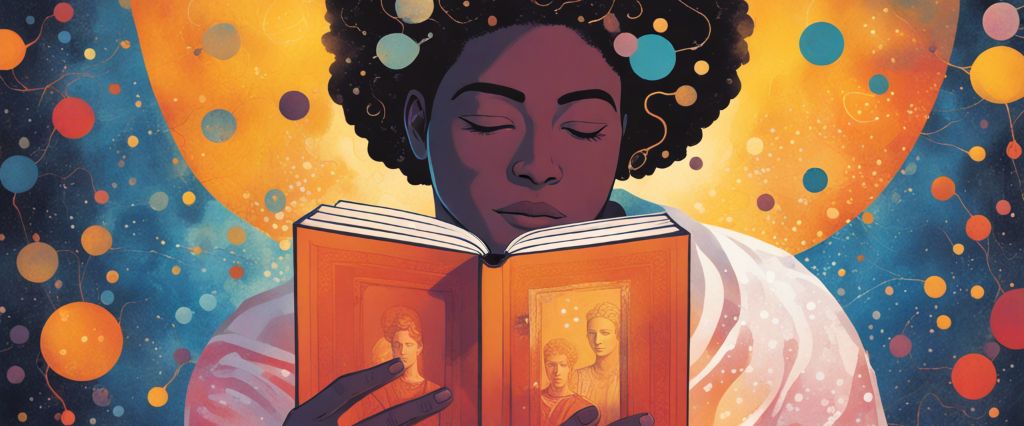
Chapter 1 What's Book The Book of Hope by Douglas Abrams
The Book of Hope by Douglas Abrams is a collection of conversations and wisdom from spiritual leaders, human rights advocates, and visionaries from around the world. In this book, Abrams, the author of The Book of Joy, brings together various voices to explore the theme of hope, addressing the challenges and despair that many people experience in today's world.
The book includes interviews with influential personalities such as His Holiness the Dalai Lama, Archbishop Desmond Tutu, Thich Nhat Hanh, and Malala Yousafzai, among others. These conversations delve into the nature of hope, its significance in our lives, and how it can be cultivated and sustained even in times of adversity.
Through personal stories, insights, and practical advice, The Book of Hope aims to offer readers guidance and inspiration to find hope and resilience within themselves. It explores the power of forgiveness, compassion, and empathy as tools to overcome despair and to create a more hopeful and compassionate world for future generations.
Overall, The Book of Hope serves as a guide and resource for individuals seeking solace, encouragement, and a renewed sense of purpose, reminding us that even in the darkest times, hope is a vital force that can help us navigate through life's challenges.
Chapter 2 Is Book The Book of Hope A Good Book
Yes, "The Book of Hope" by Douglas Abrams is considered a good book that is worth reading. It offers valuable insights and wisdom from renowned spiritual leaders, the Dalai Lama and Archbishop Desmond Tutu. The book explores the themes of joy, resilience, and finding hope in challenging times. It has received positive reviews for its inspirational content and the profound teachings shared by the authors. If you are interested in personal growth, spirituality, and finding hope amidst difficulties, "The Book of Hope" is definitely worth considering.
Chapter 3 Book The Book of Hope by Douglas Abrams Summary
The Book of Hope is a collaborative dialogue between His Holiness the Dalai Lama, Archbishop Desmond Tutu, and author Douglas Abrams. The book explores the theme of hope in times of adversity and offers insight and guidance on finding hope and happiness in life's challenges.
Through conversations and reflections, the Dalai Lama and Archbishop Tutu share their personal experiences and wisdom, discussing topics such as suffering, fear, forgiveness, and gratitude. They provide practical advice on how to cultivate and maintain hope, even in the face of difficult circumstances.
The book also delves into the idea of joy, discussing its importance and its connection to hope. The authors highlight the power of embracing joy and gratitude as a means to finding hope, resilience, and a sense of purpose.
Throughout the book, Abrams weaves his own experiences and insights into the conversations between the spiritual leaders, offering a relatable and accessible perspective on the topic of hope.
The Book of Hope is ultimately a testament to the indomitable human spirit and the capacity for hope and happiness, even in the darkest times. It provides readers with guidance and inspiration to navigate through life's challenges and find hope, joy, and inner peace.

Chapter 4 Book The Book of Hope Author
Douglas Abrams is an author, editor, and literary agent based in California, USA. He is best known for collaborating with renowned figures, including the Dalai Lama, Archbishop Desmond Tutu, and others.
"The Book of Joy: Lasting Happiness in a Changing World" is one of Abrams' notable works. Released in 2016, this book is based on a week-long conversation between the Dalai Lama and Archbishop Desmond Tutu, and it offers insights and wisdom on finding joy and cultivating resilience. It quickly became a New York Times bestseller.
As of my knowledge cutoff date in September 2021, Douglas Abrams has not published a book titled "Book The Book of Hope." If you are referring to another book or if the book was released after my knowledge cutoff date, I would recommend checking recent publications by Abrams for accurate information.
Chapter 5 Book The Book of Hope Meaning & Theme
Book The Book of Hope Meaning
The Book of Hope by Douglas Abrams is a compilation of conversations with His Holiness the Dalai Lama and other influential figures. Its meaning lies in offering inspiration, guidance, and optimism to readers, particularly during challenging times.
The book addresses questions about hope, its significance, and how it can be cultivated in individuals and communities. Through the wisdom shared by the Dalai Lama and other spiritual leaders, scientists, artists, and activists, the book aims to illuminate the transformative power of hope and its ability to bring positive change to the world.
The conversations delve into various aspects of hope, such as its connection to compassion, forgiveness, resilience, and the importance of authentic connections with others. The book also explores topics such as climate change, social justice, and compassion in action, providing practical insights and strategies for individuals to make a positive impact in their own lives and their communities.
Overall, The Book of Hope encourages readers to embrace hope as a powerful force for personal growth, societal change, and creating a more compassionate and sustainable world. It reminds us that even in the face of adversity, we have the capacity to cultivate hope and make a difference in our lives and the lives of others.
Book The Book of Hope Theme
The theme of "The Book of Joy" by Douglas Abrams is the power of finding hope and joy in the face of adversity. The book explores the teachings and insights of Archbishop Desmond Tutu and the Dalai Lama as they come together for a week-long conversation on how to find lasting happiness in a world filled with suffering. Throughout the book, the theme of hope is threaded, as the authors discuss the importance of maintaining hope even in the darkest of times. They share stories of their own struggles and offer practical suggestions for cultivating hope and joy in everyday life. Ultimately, the book offers a message of hope, reminding readers that even in difficult circumstances, finding joy and maintaining hope is not only possible but also essential for living a meaningful and fulfilling life.
Chapter 6 Other Accessible Resources
- Amazon: The Book of Hope by Douglas Abrams is available for purchase in both physical and Kindle formats on Amazon. Customers can find detailed book descriptions, reviews, and sample chapters on the product page.
- Goodreads: Goodreads is a popular social media platform for book lovers to discover, review, and discuss their favorite reads. The Book of Hope by Douglas Abrams has a dedicated page on Goodreads with information about the book, reviews from readers, and ratings.
- Official Website: The official website of Douglas Abrams may include information about The Book of Hope, its background, and updates related to the author and book. This could be a reliable source for news and additional insights.
- Publisher's Website: The publisher of The Book of Hope, such as Penguin Random House or HarperCollins, will likely have a dedicated page for the book on their website. This page can provide a synopsis of the book, author bio, reviews, and other relevant resources.
- Social Media Platforms: Searching for hashtags related to The Book of Hope or following the author's social media accounts can provide up-to-date information, reviews, and discussions about the book. Platforms like Twitter, Instagram, and Facebook are commonly used by authors and publishers to engage with readers.
- Book Review Websites: Websites such as Kirkus Reviews, Booklist, and Publishers Weekly often provide detailed reviews, summaries, and ratings for a wide range of books. Conducting a search specifically for reviews of The Book of Hope can provide in-depth insights and opinions.
- Podcasts: There may be podcasts where the author or relevant experts discuss The Book of Hope. Searching for podcasts dedicated to book discussions or spirituality topics may yield interviews or episodes featuring the author or the book.
- YouTube: YouTube is a popular platform for book reviews and author interviews. Searching for videos related to The Book of Hope or the author's name may result in content where the book is discussed, summarized, or reviewed.
- Online Book Clubs: Various online book clubs, like Oprah's Book Club or Reese's Book Club, might have featured The Book of Hope for discussions among members. Searching for these book clubs or forums related to the book can provide insights into readers' experiences and interpretations of the book.
- Academic Databases: If you are looking for scholarly articles or critical analysis of The Book of Hope, academic databases like JSTOR, ProQuest, or Google Scholar can be valuable sources. These databases provide access to academic journals, dissertations, and conference papers.

Chapter 7 Quotes of Book The Book of Hope
Book The Book of Hope quotes as follows:
1) "Hope is seeing the light in the darkest of times and believing in its power to guide us forward."
2) "Hope is not just a wish, it is a force that propels us to take action and create positive change."
3) "When we cultivate hope within ourselves, we become beacons of light for others, inspiring them to find their own strength."
4) "True hope doesn't ignore pain and suffering, but rather acknowledges it and finds a way to rise above it."
5) "Hope is not found in external circumstances, but within the depths of our own hearts."
6) "In times of uncertainty, hope is the compass that points us towards a brighter and more promising future."
7) "Hope is not blind optimism, but a steadfast belief in our ability to overcome challenges and find solutions."
8) "Hope is contagious - when one person finds it, it spreads to those around them, creating a ripple effect of positivity and resilience."
9) "Hope is the fuel that ignites our dreams and gives us the courage to pursue them, no matter the obstacles."
10) "Hope is the anchor that keeps us grounded in the present moment, while also propelling us towards a future filled with possibility."
Chapter 8 Similar Books Like Book The Book of Hope
- "The Power of Now" by Eckhart Tolle: This profound spiritual guide teaches readers how to live in the present moment and transcend negative thoughts and emotions. It complements "Your Erroneous Zones" by emphasizing the importance of mindfulness and self-awareness in creating a fulfilling life.
- "Man's Search for Meaning" by Viktor E. Frankl: This powerful memoir by renowned psychiatrist Viktor Frankl explores his experiences as a Holocaust survivor and the lessons he learned about finding meaning and purpose in life. It offers deep insights into the human psyche and encourages readers to seek their own path to happiness and fulfillment.
- "The Four Agreements" by Don Miguel Ruiz: In this influential book, Ruiz presents four principles or agreements that can transform our lives and relationships. Drawing from ancient Toltec wisdom, he explores concepts such as being impeccable with your word, not taking things personally, not making assumptions, and always doing your best. This book complements "Your Erroneous Zones" by providing practical tools for personal growth and self-improvement.
- "The Alchemist" by Paulo Coelho: This magical and inspiring novel tells the story of a young shepherd boy named Santiago who embarks on a journey to discover his personal legend. Filled with wisdom and spiritual insights, "The Alchemist" teaches the importance of listening to one's heart and following one's dreams. It resonates well with the themes of self-discovery and authenticity explored in "Your Erroneous Zones."
- "Meditations" by Marcus Aurelius: Considered a classic in Stoic philosophy, "Meditations" offers a collection of the personal reflections and thoughts of the Roman Emperor Marcus Aurelius. It provides timeless wisdom and practical insights into achieving tranquility, dealing with adversity, and living a virtuous life. This book is a valuable addition to any self-help library, as it encourages readers to cultivate self-discipline and find inner peace.